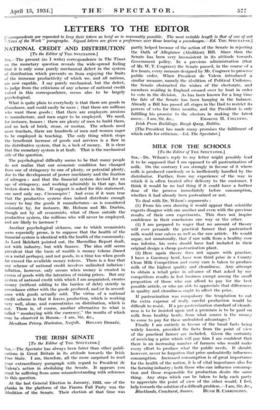LETTERS TO THE EDITOR [Correspondents are requested to keep their
letters as brief as is reasonably possible. The most suitable length is that of one of owl News of the Week" paragraphs. Signed letters are given a preference over those bearing a pseudonym.—Ed. THE SPECTATOR.]
NATIONAL CREDIT AND DISTRIBUTION
[To the Editor of THE SPECTATOR.] SIR,—The present (as I write) correspondence in The Times on the monetary question reveals the wide-spread feeling that it is only some purely mechanical defect in the system of distribution which prevents us from enjoying the fruits of the immense productivity of which we, and all nations, are now capable. I say purely mechanical, but the defect, to judge from the criticisms of any scheme of national credit voiced in this correspondence, seems also to be largely psychological.
What is quite plain to everybody is that there are goods in abundance, and could easily be more ; that there are millions who want these goods ; that there are employers anxious to manufacture, and men eager to be employed. We need, for instance, houses : there are plenty of men to build them, and no lack of brick, stone, or mortar. The schools need more teachers, there are hundreds of men and women eager to be employed in teaching. The only thing which stops the beneficent increase of goods and services is a flaw in the distributive system, that is, a lack of money. It is clear that the monetary system is at fault. That is the mechanical side of the question.
The psychological difficulty seems to be that many people do not realize that our economic condition has changed from one of stringency to one of plenty, or potential plenty, due to the development of power machinery and the fixation of nitrogen : and that the financial system devised for an age of stringency, and working admirably in that age, has broken down in this. If support is asked for this statement, one need only say, Circumspice ! And even if it were true that the productive system does indeed distribute enough money to buy the goods it manufactures—as is considered axiomatic by, for instance, Mr. Hobson and Mr. Durbin, though not by all economists, what of those outside the productive system, the millions who will never be employed, and are likely to increase ?
Another psychological sickness, one to which economists seem especially prone, is to suppose that the health of the financial system is identical with the health of the community. As Lord Melchett pointed out, the Macmillan Report dealt, not with industry, but with finance. The idea still seems prevalent that the basis of wealth is money tokens (based on a metal perhaps), and not goods, in a time too when goods far exceed the available money tokens. There is a fear that any scheme of national credit involves unlimited inflation : inflation, however, only occurs when money is created in excess of goods with the intention of raising prices. But any system of national credit with which I am acquainted, creates money (without adding to the burden of debt) strictly in accordance either with the goods produced, and/or in accord- ance with goods actually sold. The virtue of a national credit scheme is that it leaves production, which is working wry well, alone, and concentrates on distribution, which is not. There is, of course, another alternative to what is called "monkeying with the currency," the results of which may be observed in Russia.—I am, Sir, &c.,
Mendham Priory, Harleston, Norfolk. BONA3W DORREE.
















































 Previous page
Previous page